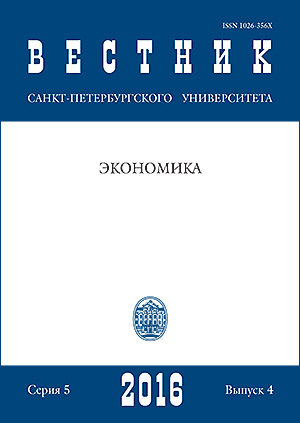О гудвилле «собачьем, кошачьем» и не только: к вопросу о надуманных категориях, классификациях и алгоритмах
DOI:
https://doi.org/10.21638/11701/spbu05.2016.407Аннотация
Статья посвящена рассмотрению экономической сущности одной из важнейших экономических категорий — гудвилла как фактора ценообразования на рынке капитала и формирования представления об экономическом потенциале хозяйствующего субъекта. Тема гудвилла наиболее активно изучается специалистами в области бухгалтерского учета. Однако эта категория не является чисто бухгалтерской, а потому в ее адекватном восприятии фактически заинтересованы широкие круги участников бизнес-среды. Кратко проанализирована история возникновения данного понятия в экономике и праве, продемонстрированы в исторической ретроспективе основные дискуссии по его трактовке, оцениванию и отражению в информационной среде. Показано, что трактовка гудвилла как нематериального актива весьма условна. Отмечена присущая некоторым разработкам российских ученых несостоятельность прямого заимствования оценочных моделей и алгоритмов в финансовой аналитике. Объяснены причины ошибочных определений и алгоритмов оценки гудвилла, приводимых в отечественной
научной, учебно-методической и нормативной литературе. Приведены примеры, демонстрирующие значимость данной категории в рыночной экономике. Объяснены логика оценивания гудвилла и практика применения счетных алгоритмов. В основной части статьи рассмотрены четыре ключевых сюжета, раскрывающих: 1) сущность гудвилла; 2) его типологии; 3) логику и варианты оценки; 4) специфику представления в отчетности. Библиогр. 47 назв.
Ключевые слова:
гудвилл, деловая репутация, внутренне созданный и приобретенный гудвиллы, оценка гудвилла, амортизация гудвилла, представление гудвилла в отчетности, бухгалтерский баланс, нематериальный актив, тест на обесценение
Скачивания
Библиографические ссылки
обращения: 15.05.2016).
References in Latin Alphabet
Financial Accounting: An Introduction to Concepts, Methods and Uses / C. P. Stickney, R. L. Weil, K. Schipper, J. Francis. South-Western Cengage Learning. 2010. 960 p.
Translation of references in Russian into English
Klimashina Iu. S. Razvitie metodicheskikh osnov bukhgalterskogo ucheta delovoi reputatsii organizatsii. Dis. kand. ekon. nauk [Development of methodical bases of accounting of business reputation of the organization. Dis. PhD]. Available at: https://nsuem.ru/scientifi c-activities/dissertation-councils/news/ (accessed: 15.05.2016). (In Russian)
Blaug R., Lekhi R. Accounting for Intangibles: Financial Reporting and Value Creation in the Knowledge
Kaner H. A New Theory of Goodwill. London, Sir I. Pitman & Sons, Ltd, 1937. 73 p.
The Billion Dollar Startup Club. Available at: http://graphics.wsj.com/billion-dollar-club/ (accessed: 13.07.2016).
Загрузки
Опубликован
Как цитировать
Выпуск
Раздел
Лицензия
Статьи журнала «Вестник Санкт-Петербургского университета. Экономика» находятся в открытом доступе и распространяются в соответствии с условиями Лицензионного Договора с Санкт-Петербургским государственным университетом, который бесплатно предоставляет авторам неограниченное распространение и самостоятельное архивирование.






